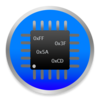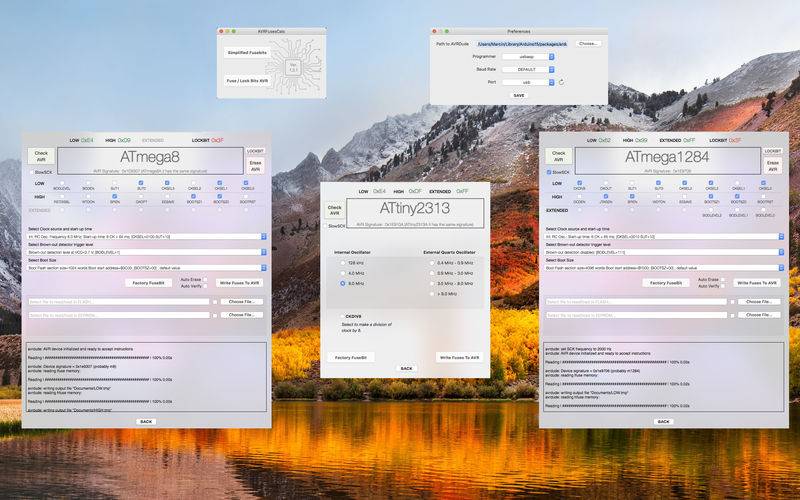点击按钮跳转至开发者官方下载地址...
“AVRFusesCalc” is an application through which we can easily set the fuse bits and lock bits in the microcontrollers ATmega and ATtiny. To be able to set fuse bits should be installed on the avrdude and AVR-GCC package.
People using Arduino can use "avrdude" which comes with this application. The access path to "avrdude" from Arduino, is best set in the dialog panel in the "AVRFusesCalc" preferences. For more information how install avrdude from Arduino, please visit my website.
“AVRFusesCalc” recognizes the connected microcontroller and loads its settings, regardless of the clock speed. It can also determine what programming protocol, SPI or TPI, is required for communication with the microcontroller.
Fuse bits can be set in two ways.
The first is the so-called “Simplified Fusebits”. This is ideal solution for beginners, who want only to select the clock and have no sufficient knowledge about fuse bits in AVR.
The important thing is that for 99,99 does not block the microcontroller using “Simplified Fusebits”.
The other way is fuse bits for advanced.
By using this option, you must have knowledge about individual bits which are available in a particular microcontroller.
Depending on the connected microcontroller we have access to the type of Low, High or Extended fuse bits and the Lock bits.
The application has been tested with the programmer USBAsp and Arduino UNO.
I would like to ask you to evaluate the application in the AppStore. The comments will also be welcome. Thank you in advance for your time.
***************************************************************************************************
"AVRFusesCalc” to pierwsza aplikacja z graficznym interfejsem użytkownika na macOS, dzięki której w prosty sposób, bez obaw o zablokowanie mikrokontrolera, można ustawić fusebity oraz lockbity w procesorach ATmega i ATtiny. Aby móc ustawiać fusebity należy mieć zainstalowany w systemie program “avrdude” wraz z potrzebnymi bibliotekami z pakietu AVR-GCC.
Osoby korzystające z Arduino, mogą użyć "avrdude" które jest dostarczane wraz z tą aplikacją. Ścieżkę dostępu do "avrdude" z Arduino, najlepiej ustawić poprzez okno dialogowe w preferencjach "AVRFusesCalc".
Dokładne informacje na temat instalacji "avrdude" z Arduino znajdziesz na mojej stronie www.
“AVRFusesCalc” rozpoznaje podłączony mikrokontroler i wczytuje jego ustawienia, bez względu na prędkość taktowania. Potrafi również określić, jaki protokół programowania, SPI lub TPI, jest wymagany do komunikacji z mikrokontrolerem.
Fusebity można ustawiać na dwa sposoby.
Pierwszy to tak zwane „Fusebity uproszczone”.
Jest to idealne rozwiązanie dla osób początkujących, którym zależy tylko na ustawieniu taktowania i które nie mają jeszcze dostatecznej wiedzy na temat fusebitów w procesorach AVR.
Ważne jest to, że na 99,99% nie zablokujemy procesora korzystając z fusebitów uproszczonych.
Drugi sposób to fusebity dla zaawansowanych. Korzystając z tej opcji, należy posiadać wiedzę na temat poszczególnych bitów dostępnych w konkretnym mikrokontrolerze.
Poza ustawianiem w tej zakładce fusebitów i lockbitów, istnieje też możliwość wgrania „wsadu” do mikrokontrolera oraz odczytania „wsadu” z mikrokontrolera i zapisania go do pliku. Możliwe jest również przywrócenie fabrycznych ustawień fusebitów, oraz skasowanie pamięci mikrokontrolera.
Na chwilę obecną program został przetestowany na programatorach zgodnych z USBAsp i na Arduino UNO.
Zachęcam do wystawienia komentarza i oceny.







